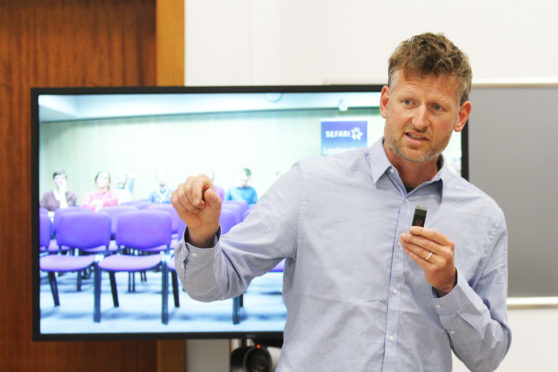The Scottish Government’s anti-GM stance was yesterday condemned for helping to damage the interests of some of the world’s poorest people.
Mark Lynas, a former eco-warrior who, five years ago, made a dramatic U-turn from trying to shut down scientific research to defending it, told farmers and scientists that African anti-GMO campaigners had used bans by western governments as an argument to question the technology’s safety.
“Don’t ever think that the policies you might have here in Scotland don’t directly affect the food security of people in Africa and other developing countries, because they do,” he said.
“The policies of the SNP and other parties that persist in superstitious
attitudes towards GMOs directly harm the interests of some of the poorest
people in the world, and I think it’s a terrible shame to be carrying on
promoting them,” he added.
Speaking after his lecture to the Scottish Society for Crop Research in Dundee, Mr Lynas said he believed the SNP’s administration’s approach to GMOs was ideological and would take “a lot of shifting”.
“It’s a travesty of Scotland’s proud history as a world leader of scientific discovery to have a scientific institute here in Scotland funded by government which is unable to carry out its work,” he said
“You can’t trial a potato in a greenhouse, these crops need to be grown outside. And you probably also risk seeing a brain drain of the brightest and best.
“If I was a young molecular biologist I certainly wouldn’t locate in Scotland.”
Mr Lynas, who was one of the leaders of the anti-GM movement in the 1990s and regularly destroyed field trials of GM crops, came clean over his about-turn to an audience of farmers at the Oxford Farming Conference in 2013.
“I’m now trying to defend the idea that science matters,” he said. “Scientists themselves need to be getting out there and explaining to the public why their work is important. We can’t allow the forces of anti-science to worsen our problems and undermine the potential of humanity in the future.”
He said that losing the GMO argument was the greatest scientific failure of the last half century but warned against seeing GM as a magic bullet.
“Blight resistant potatoes is one case where it could be applied,” he said.
“We can’t go on doing what we’re doing at the moment, which is to spray a lot of fungicide. Wouldn’t it be better to use a couple of resistant genes?”
nnicolson@thecourier.co.uk










